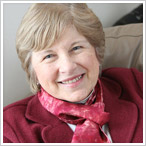Joanne Otto (Part 2)
Author, Academic Language Specialist—God Shining and Singing Us
By Marjorie F. Eddington
Categories: Arts, Education In addition to writing Daughter of Jerusalem, Joanne Otto has also written The You-Song for children. It came as a result of her work with children who struggle with dyslexia. She never saw them as disabled. Find out how she helped them in many ways with her spiritual perspective, her teaching, and her book.
 Tell us about your life before writing Daughter of Jerusalem. Tell us about your life before writing Daughter of Jerusalem.
I had a five-year teaching career when I was first married. I stopped teaching when I became a mother, and my husband was able to support us. After one of our girls was married and the other was taking off for college, I went back to teaching high school for three or four years and then became an academic language therapist, helping children who struggle with dyslexia to improve their reading and writing skills.
How did you go about helping these students?
One of the important points I learned from my training was that you want these kids to be successful at least 95% of the time. So many have been bruised from going to a school where they have difficulty keeping up. So every lesson that I taught these kids I had to spend a lot of time planning. I was working with a very carefully designed program, and I moved forward by small increments that would help them feel successful.
Working with these kids prompted me to write The You-Song. I felt they should have a book that they could read fairly easily, so I used only words that were easily decodable and conformed to the rules of phonics or words that were so common that they would know them on sight.
I also wanted the book to be beautiful and to encourage them and help them see themselves as special and important. So I wrote, "You are a song like no other song God has ever sung." The photos of children, which we used as illustrations, really bring out the meaning of the words. The book would not be complete without them. That's one reason why over ten years passed between writing the first draft and publishing the book. As soon as my daughter, Meghan, was able to work with me on illustrations and page design, and an author friend had taught me about independent publishing, the barriers to publication disappeared.
Well, The You-Song is a wonderful gift to those children and to the world. My own children love it—love the words and love the photos of the other children. The beauty of the book obviously came from the way you saw them, too.
Oh, I'm delighted to know that your family is enjoying The You-Song. It means a lot to me. During the years I taught these kids, I found it very important to see them as able, never as disabled. I have never used the word "disability" in talking to or about the children. I much prefer the term "learning difference." I found that these were very intelligent kids who just saw print differently than most of us do. Most people function in two dimensions, but those challenged with dyslexia see print in three dimensions, so a lower case "b" could easily look indistinguishable from a "d."
When starting out with a new pupil, rather than attempting to diagnose his or her "problem," I would identify the knowledge gaps that needed filling and use the program I'd been taught to do just that. Occasionally, I hear from former students or their parents about a success or a graduation, and it's deeply satisfying to know I've been able to make a difference in these students' lives.
Are there any memorable instances or students?
I took on one student when I was a rookie because I thought it would give me some helpful experience, and I felt compassion for him. He was in the 10th grade and the only words he could read were "I" and "a." He couldn't recognize any other. I'm sorry he didn't stay with me as long as I was willing to stay with him, but by the time he left, he was able to tell his mother the name of a movie he was watching on television because he had read the words on the screen. After 78 lessons, he was way ahead of where he had started.
At the other end of the spectrum, there was a very bright high school student who was having difficulty. I figured I'd just use the high school version of the program I work with. He was such a quick learner that we got through almost the whole program in eight or nine weeks during the summer. When he returned to school in the fall, he felt much more confident and capable.
Are there any Bible passages you relied on throughout your career?
I honestly can't single out specific passages I've relied on repeatedly, but I absolutely love 2 Cor 4:6: "For God, who commanded the light to shine out of darkness, hath shined in our hearts, to give the light of the knowledge of the glory of God in the face of Jesus Christ." It's become my favorite Bible verse. To me it's all about who we really are and our connection with God. God is singing us: We're His song.
And that's what you were doing with the kids—seeing them in this light.
Yes, and that's the light Jesus saw that enabled him to heal. And that's the way of seeing that Mara was looking for at the end of Daughter of Jerusalem. Without some sense of what this means, my career as an academic language therapist would have been much more limited, and my two books might never have been written. It's all been about God's shining. |